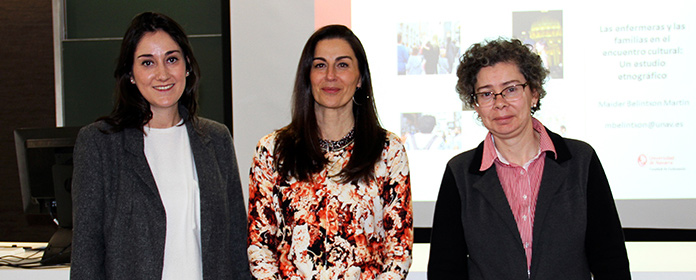Migrations and health: from perceptions to health care
A roundtable organized by the Institute Culture and Society (ICS), the School of Nursing and the School of Humanities and Social Sciences analyzed the challenges for the health systems

FOTO: Isabel Solana
“Migrations and Health: From perceptions to health care” was the topic of discussion at a roundtable organized by the Institute Culture and Society (ICS), the School of Nursing and the School of Humanities and Social Sciences. Participants included Maider Belintxon, from the Health Promotion research area and Carolina Montoro, from the Department of History, History of Art and Geography. Ana Marta González, ICS’s scientific coordinator, moderated the roundtable.
Maider Belintxon presented part of the findings from her doctoral thesis on nurses and families in cultural encounters, in which she collected data from six nursing stations at two health centers in Navarra.
The expert proposes training health professionals, adapting resources and programs to include diversity, offering care centered on the person, and building a health system on an integrative model that promotes health care at all levels.
For her part, Carolina Montoro presented a study on the social determinants of health outcomes in Moroccan immigrants in Spain. This case study, which is broken down by gender, is a part of the Moroccan Migration Project, to which the University of Princeton and the Red Cross also belong.
The research was based on participants’ self-assessment of their health and its evolution starting from the moment of migration, an indicator widely used in health studies.
The study revealed that the main factor that boosts health outcomes for women is work autonomy, including having their own income and some degree of independence.
With regard to men, the first significant variable is housing: the older- and, therefore, cheaper- their home, the better their health outcomes because it represents a lower cost burden. Social relationships with their countrymen came second, distantly followed by a relatively high level of education.




